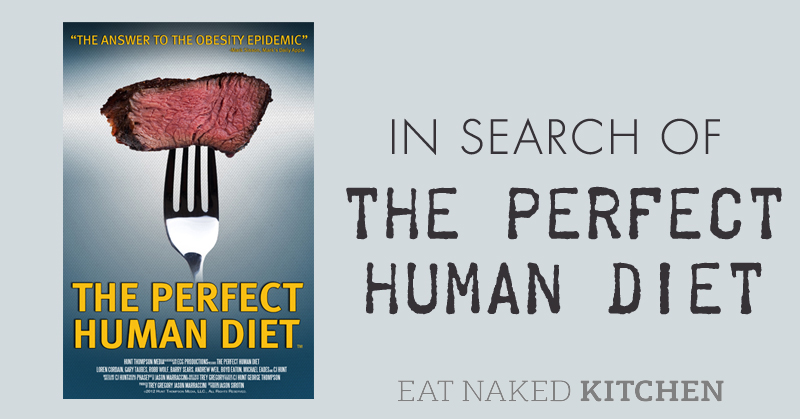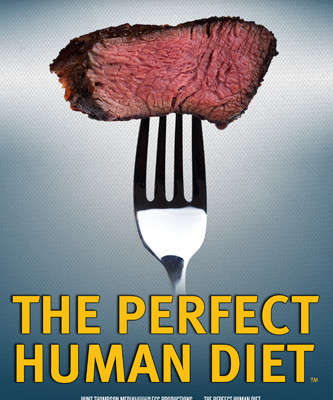
By Margaret Floyd, NTP HHC CHFS
Last night something unusual happened in the Floyd-Barry household. Unusual for 2013, I should say. We watched a movie.
Now before you accuse Chef James of breaking his media fast, we agreed at the beginning of this year that he would make the very rare exception to watch a film that was specifically and directly related to our line of work. In Search of the Perfect Human Diet was one such exception.
A lot of movies explore the politics and economics of food, diet and health: SuperSize Me, Food Inc., and Forks over Knives being some of the more widely seen, not to leave out those such as King Corn, Farmageddon, and Food Matters.
What’s new about In Search of the Perfect Diet is its focus on anthropology and what we, as humans, have been eating for literally hundreds of thousands of years. It’s hard to argue with evolution.
The movie follows filmmaker CJ Hunt’s 10-year search for the “perfect human diet” after the raw vegan diet he adopted following a near-death experience failed to sustain him. Stepping outside politically- and emotionally-charged and highly confusing nutrition science, he goes to our ancestors – not just our grandparents and great-grandparents, but those from tens and hundreds of thousands of years ago.
Here are a few of the interesting points:
– Over 70% of the foods we eat today did not exist before the industrial revolution. From an evolutionary perspective, there is simply no way for our bodies to know what to do with these “foods” (which, as we all know, aren’t real food at all).
– Broken down by nutrient ratios, what we feed cattle to “fatten them up” is almost identical to the government-sanctioned food pyramid for a “healthy” diet. Is it any wonder we are in the middle of an obesity epidemic?
– It was only when we started eating animal foods that our brains doubled in size, allowing for the modern human and all our advances. Interesting irony that the very capacity for making an argument for a plant-based diet comes from our ancestors’ move away from a plant-based diet.
– An Australian study was done with a group of aborigine who had grown up in a traditional hunter gatherer environments, and then moved into urban environments where they adopted modern diets, lifestyles and (unsurprisingly) health concerns such as obesity, type 2 diabetes, and heart disease. They returned to the outback and their hunter gatherer ways for a seven week period.
In just seven weeks (!!), they lost weight and all their health markers (insulin resistance, blood pressure, cholesterol levels) normalized.
Interestingly, they were less active than in their urban environments, so exercise was NOT a factor.
– Very simply, as Prof. Mike Richards, Max Planck Institute for Evolutionary Anthropology says, “What we are adapted to [evolutionarily] is not what we are living [or eating] right now.”
I do wish the film spent a little more time diving into the issue of quality. Clearly our Paleolithic ancestors were eating exclusively wild game, and wild fruits and vegetables grown in nutrient-rich soil. There was no such thing as a feedlot or chemical pesticide.
Ultimately, what we choose to eat is a very personal decision. But what we are designed to eat is evolutionarily and genetically wired. I highly encourage you to take the time to watch this thought-provoking film.





So confusing! I have been diagnosed with type 2 i already have neuropathy in my legs. I weigh 105. I go to the gym or to yoga 4-5 times a week. I go to the farmers market every Saturday to purchase my produce, meat, milk, etc. i have been counting carbs, experimenting with going off grain for the last 18 months. My sugars have bounced around in the 120-190. I started the “fireman” diet— no animal products and my sugars have been absolutely consistent under 100. I have worried about the soy, but my high blood sugars worry me more. This food world is extremely tricky
Elizabeth – I’m so sorry you’ve been struggling with this! It certainly does sound like you’ve found what works for you. You are an excellent example of bio-individuality. There is no one formula that works for everyone. It’s a very personal thing. And listening to your body – as you’re doing – is exactly the right approach.
Thanks for the breakdown on this film – sounds like it has a lot of interesting information to offer. Love the anthropological perspective on it. Hope to see it!
Elizabeth – I hope that you can find what works for your body. I know that people who specialize in proper eating could help (dieticians). It is never easy to keep on a proper diet when society pushes all these different things that are supposed to be good for you. I have found myself in the organic section more often than not lately, just because of all the additives and preservatives that are in the food in the regular part of the grocery store. My husband loves refried beans with his burritoes. I was looking at the label of the vegetarian vs the regular, and they add lard to regular refried beans. Why? I haven’t the slightest clue how that is a necessary ingredient. It just shows that you have to be aware of what goes into the foods we take for granted.
I am a little sceptic about the paleo diet and I see one potential weakness with the argument presented in the film. Evolution doesn’t always work in our interest. It works in the interest of our species (or rather genes). Our interest and that of our genes are not always aligned (I would refer those interested to the “Selfish Gene” book). From the point of view of mother nature meat may be good for us. It allows us to store a lot of energy as fat since in the prehistory meat wast that plentiful as it is right now and wild game was rather infrequent. Therefore we should be also eating meat only from time to time. But what I find most interesting is that from the point of view of our species we should have children fast and many (having more fat from meat helps during pregnancy) and after our children can take care of themselves we should better die not to be a burden to our clan. Evolution doesn’t care that we live long and happy lives. After we loose vitality and ability to reproduce we are pretty much worthless. This study about aboriginal people in Australia should also mention the average life expectancy between true aboriginals and city-dwelling Australians. Our ancestors maybe head no diabetes but they lived short anyways.
Interesting movie but I don’t think it explored the whole idea well.
“From the point of view of mother nature meat may be good for us. It allows us to store a lot of energy as fat since in the prehistory meat wast that plentiful as it is right now and wild game was rather infrequent. Therefore we should be also eating meat only from time to time.”
Eloquently put!…Not really actually. Perhaps you were meaning to communicate humans should eat less meat today because they did not manage to kill much in prehistorical times. Mr. Hunt’s documentary directly contradicts this assertion. I think you arrive at this opinion rather quickly without good support. One of the main strengths of Mr. Hunt’s documentary is the extensive use of scientific data to support the arguments. A possible rebuttal to Mr. Hunt’s proposal may involve the use of an individual genetic variation which you briefly address. I don’t believe modern science is able to formulate dietary recommendations for INDIVIDUALS based on genetic profile. This very well may change given the rapid advancements in biochemistry and genetic sequencing but let’s not try to predict the future, rather let’s learn from the past.
Please excuse me if I seem argumentative, I am only approaching this as an academic debate.
RU mother nature
There are some real foolish things insinuated at in this post that you should think about. The amount of meat and protein in the average American’s diet right now is far beyond anything our ancestors had access to. If you don’t believe so, go out and try to run down animals (what we were doing before the spear) and see how many people it takes and how many hours it takes to run down a 4 legged animal.
Our ancestors went from almost no animal protein to some animal protein that caused our brains to increase in size massively. It does not mean that our ancestors ever moved away from a diet where most calories came from plants (in Africa, fruits and nuts are literally so abundant a bushman commented “why plant? (paraphrased)”.
But all of this ignores the fact that evolution didn’t stop 100,000 years ago. We gained the extraordinary advantage of milk drinking some 8000 years ago. We added large amounts of grains to our diet. All of these things provided huge evolutionary advantages. The question you should be asking is what changed in the last 50 years that caused western and developed economies to begin producing such horrendously fat people.
Sean, you make good points. I’m not suggesting (nor is this movie) that we eat copious amounts of meat – what I’m suggesting is that we are evolutionarily adapted to eating some meat, and so an exclusively plant-based diet is perhaps not optimal for how we have adapted. I would agree with you about dairy and perhaps grains – but many people still struggle with the digestion of both of these things, and there’s a significant school of thought that argues that the introduction of grains in particular was actually detrimental to our health, not beneficial. I’m not sure that it’s possible to come to a solid conclusion on this, but the arguments for it are fascinating. I don’t think that we pay enough attention to the evolutionary aspect of things, or how slow the evolutionary process actually is.
I have watched this documentary twice. I am on a personal journey to discover the best diet for me. There are a lot of good comments here, and the arguments for and against every different diet can be found throughout the internet. I have come to the conclusion that there are some people who have metabolic problems or allergies that demand a unique dietary approach. There are many anecdotal stories out there by people who successfully embrace vegan, or vegetarian, or paleo, or Adkins, or zero carb diets. There are stories of people who have cured cancer by going vegan as well as ketosis. The one common element that most theories seem to embrace is that processed sugars are bad for us. I personally have cured by type 2 diabetes and loss a significant amount of weight by eliminating sugar, limiting carbohydrates to 100 grams most days, and exercising every day (mostly walking). Learn what works for “you”.
I love your comment, Ron. Thanks! Refined sugars, in my opinion, are indeed the worst culprit, and like you and a comment above said, one thing that almost every “diet” has in common is the drastic reduction of refined sugars, and the increased consumption of simpler foods.
This documentary has completely missed what modern ranching and farming is doing to the planet. Factory farmed and ranched animals and produce are full of very unnatural substances, such as antibiotics, hormones, and pesticides They are also not as nutritious as wild or truly free-range animals or completely organic produce. Obviously, this film is 10 years old. Perhaps you will bring out another film that brings some of these VERY important topics into this conversation. Climate change and pollution of our rivers and oceans has a lot to do with the food one is offered in a market has been raised. It is NOT good for our planet or our bodies. If we destroy our planet, we won’t have to worry about what we eat. If we die off before we destroy the planet, because we choose not to address these very real problems, I guess none of these problems matter either!